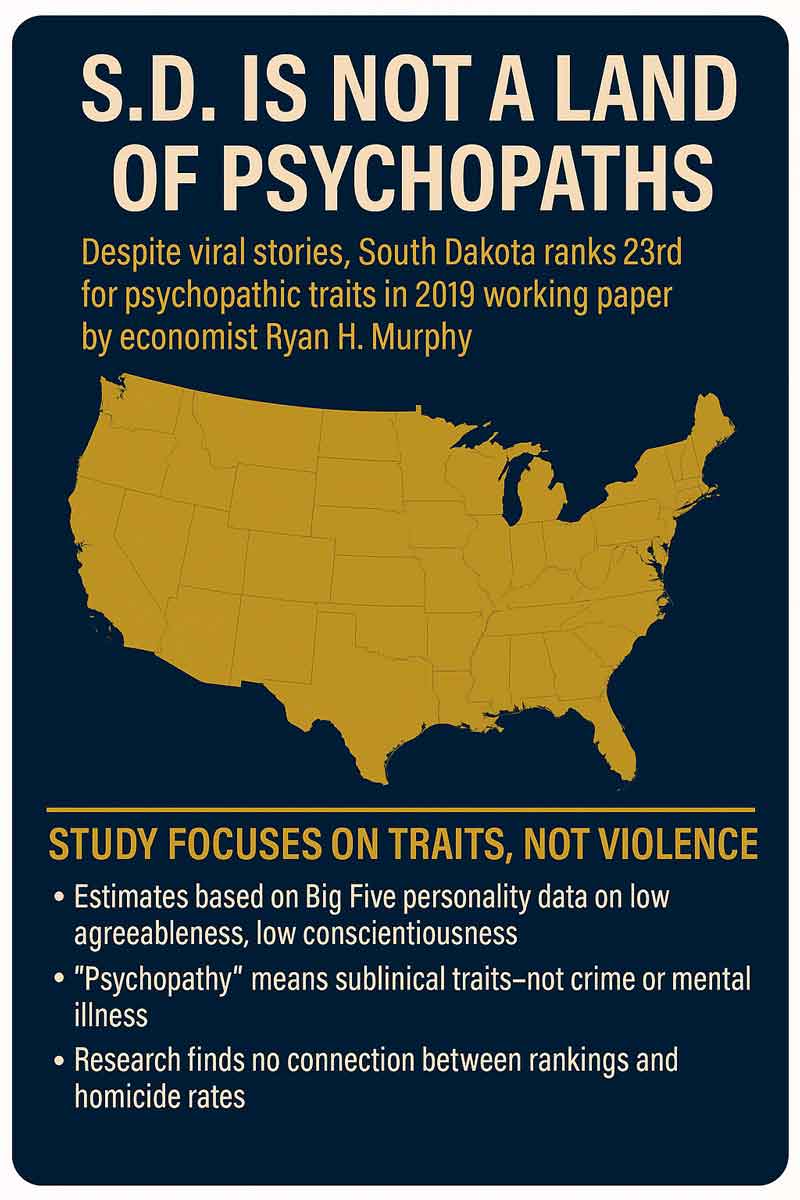South Dakota and the Psychopath Myth
Despite Viral Buzz, South Dakota Is Not a Land of Psychopaths; Media outlets misreport state’s rank in controversial personality study
By Todd Epp, Northern Plains News

South Dakota is not among the most psychopathic states in the U.S., despite what several national websites have claimed.
According to a 2019 working paper by economist Ryan H. Murphy of Southern Methodist University, South Dakota ranks 23rd out of 48 in estimated psychopathic personality traits.
The study used Big Five personality trait data—specifically low conscientiousness and agreeableness—from a 2013 peer-reviewed mapping study to create a “psychopathy index” by state.
Murphy stressed that the term “psychopathy” in this case refers to subclinical traits—not violent or criminal behavior. “This isn’t clinical diagnosis,” the paper notes. “It’s a statistical construct using personality traits like boldness, meanness, and disinhibition.”
Wrong Numbers, Real Damage
Despite that clarification, media outlets repeatedly mischaracterized the findings. A 2019 Men’s Health article ranked South Dakota 12th. Other click-driven sites, including one titled “Science Says,” claimed the state was 4th, citing no direct source or link to the original study.
The original paper does not support those rankings. It lists Washington, D.C., Connecticut, California, and New Jersey among the highest-scoring areas. South Dakota is squarely in the middle.
Murphy’s paper also found no correlation between the psychopathy rankings and homicide or violent crime rates.
Rural Norms Defy Labels
Murphy theorized that urbanization might influence psychopathy scores more than region. Densely populated states with large metro areas tended to rank higher. Rural states like South Dakota often showed personality profiles tied to self-reliance but not antisocial behavior.
South Dakota’s community-oriented culture and lower population density likely soften traits that might otherwise read as “cold” in personality metrics.
Journalism Check: Read the Paper
The incident underscores how viral news often distorts nuance. Without verifying primary sources, states like South Dakota can become scapegoats for misleading national narratives.
The 2019 working paper has not been peer-reviewed, and no follow-up study has emerged since its release. Murphy cautioned that his methodology is experimental and should not be overinterpreted.
For South Dakotans, the bottom line is clear: the state is not a hotbed of antisocial behavior. According to the original data, it’s about as average as you can get.
—30—


Are you saying we are not on meth?
Speak for yourself! 🙂 What I’m saying is that we journalists need to do a better job vetting stories from other sources. In today’s even faster-paced newsrooms with fewer editors and reporters, it can be harder to do. However, there are tools available that can make it easier to check.
I know from my days in commercial radio that “prep” services often send materials out like this to radio talent (they’re not DJs anymore). Stations pay for it. Frankly, I don’t expect the Morning Zoo girls and guys to have to research this stuff. That’s why they get the prep. But the prep companies, like journalists, should do some due diligence.
And I’m not throwing rocks. It’s easy to take as a “fact” that something reported from other news sources, particularly reputable ones, isn’t always accurate. I try to avoid that as much as possible, but sometimes things slip through. Then you need to issue a correction.
Plus, while I have met my share of at least sociopaths in South Dakota, I was offended that “they”, whoever “they” is, thought we were the birthplace of monsters, to paraphrase Michael Scott.
Maybe you should follow your own advice and tell your buddies at Dakota Scout to do the same on all issues, not just this one.
My buddies at The Dakota Scout are outstanding journalists. Believe me, they work hard to get the story right. They hold themselves to a high standard.
But we are all human. We strive for perfection, and, of course, we will sometimes fall short. They are very good at issuing corrections, including on stories where I get it wrong.
I haven’t met a single journalist in South Dakota that wants to screw up the facts. We know our reputations are on the line as well as our credibility.
Really? Your publication’s deviances from the AP style guide and standard editorial practices suggest otherwise. Maybe you can ask Bo Hutchins about that.
Yeah. What Mr. Epp typed.
grudznick and straight lawyers from Harrisburg are on the page.
Grudz, you crack me up! 😉